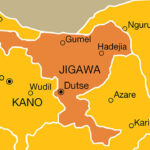
It does no credit to both the executive and the legislature that the 2017 federal budget is still floating in the wind. A flickering candle shone on it when we were repeatedly assured by spokesmen for the senate that the appropriation bill before it would be passed into law in the time it takes to say Saraki. Meaning, we took it, that it would not suffer the fate of the 2016 bill through unnecessary delays. But despite the assurances, the bill began its unhurried walk through the national assembly, raising public concern about its fate in the hands of the law makers.
Mercifully, we crossed that rickety bridge when the national assembly eventually passed the bill into law last month. The motion had become a fitful movement. We were then assured by spokesmen for the executive that the acting president, Professor Yemi Osinbajo, would soon, (that word again) sign the bill into law. It now appears that we heaved a sigh of relief too soon. The waiting game continues.
We were told last week by the senior special assistant to the president on national assembly matters, Senator Solomon Ita Enang, that the acting president would not yet sign the bill into law because of some grey areas that needed to be resolved between the executive and the legislature. He said, “Right now, the presidency is subjecting every detail of the budget, using the available systems at its disposal to ensure the figures appropriated to MDAs are consistent with the realities on ground….”
In a less obfuscated English, this means that the presidency suspects that the national assembly might have padded and thus inflated the figures submitted to it by President Muhammadu Buhari. The presidency, as happened in the case of the 2015 and 2016 budgets, sees a trap here. If the figures are padded and the acting president assents to the bill, he puts the government under the legal burden of fully implementing the budget, money or no money. So, when you hear of grey areas in this matter, do not think of colours. Think of a gorge.
Every appropriation bill submitted to the national assembly since our return to civil rule in 1999, had suffered the same fate. The argument at the root of this tortuous process of budget making at the national level is the simple question: does the legislature have the constitutional right to add to the proposed budget figures submitted to it by the president? It is, as you would imagine, a simple question to ask but there is no simple answer to it.
No one questions the constitutional right of the legislature to subject the appropriation bill to serious scrutiny. I do not think that is the issue here. The issue here is that we are not exactly sure what the legislature is supposed to do with the appropriation bill. Should it add nothing and take away nothing from what the president submits to it? It seems the presidency would say yes to that. It is unhelpful.
The legislature believes it has more fundamental responsibilities than being a rubber stamp of the presidency in this important and critical matter. I believe it does. Its members believe that they too have a duty to have a say in how and on what the government spends our money on our behalf. I am unable to fault that. The appropriation bill is a fundamental law, even if it is often treated with disdain at the federal and the state executive levels. The framers of the constitution imposed this system of budget making to ensure that the wisdom from both arms of government are brought to bear on how best to run the economy in the best interest of the country and its people.
No one says there would be no arguments over how this could be done. It would be impossible in our system of government where the three arms constitute the government not to expect the right of each branch to assert itself. But the national budget need not be a hostage to power play between the executive and the legislature. Both sides ought to recognise the fundamental national needs inherent in the federal budget. The federal budget is the father of all budgets in the public as well as in the private sectors in the land. In our not so recent past, the states did not announce their budgets until the federal government did. And the big players in the private sector waited for the federal budget to see government plans for the sectoral development of the nation. They took cues from the federal government budget in making their own budgets. They no longer do.
This brings us to the elementary fact, namely, that the budget is more than how much and where the federal government intends to spend the appropriated budgetary fund for the year. Everything in the country rides on it. It is supposed to pack, in its slim package, the ambition of the government in the economic and social development of the country in a twelve-month period. It sign-posts the direction of our economic and social development. It speaks to the hope of the people in their government. It also tells us what the government thinks of its responsibilities to the country and its people in education, health, roads, energy, transportation and other critical areas of our social and economic development. When the hopes of the people and the country are tethered to the shaky wagon of such a document, the executive and the legislature ought to do more than argue over who has the power to give us the final figures in the appropriation budget.
President Buhari submitted the appropriation bill to the national assembly on December 14 last year. We are now almost in the middle of June, half way to the end of the year. The implications of the delay in the budget are obvious. We are passing through a recession, a biting and difficult time for the nation and its people. The economy is in urgent need of reflation. The capital expenditure of the federal government has the capacity to stimulate the economy and, hopefully, help, move us out of this hell hole called recession. Think of a new hospital under construction and its immediate effect on the local economy and employment through the engagement of sub-contractors such as sand, gravel, water and cement suppliers; construction workers made up of skilled, semi-skilled and unskilled workers and, of course, the local food sellers at the construction site. What these people earn makes a major difference to their economic circumstances.
Such minor steps would help to pull the nation and its people out of the recession. Not rocket science, surely, but common sense.
 Join Daily Trust WhatsApp Community For Quick Access To News and Happenings Around You.
Join Daily Trust WhatsApp Community For Quick Access To News and Happenings Around You.


